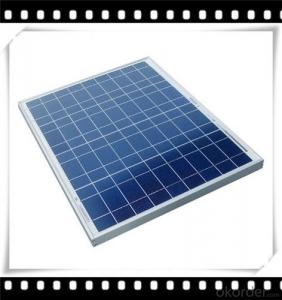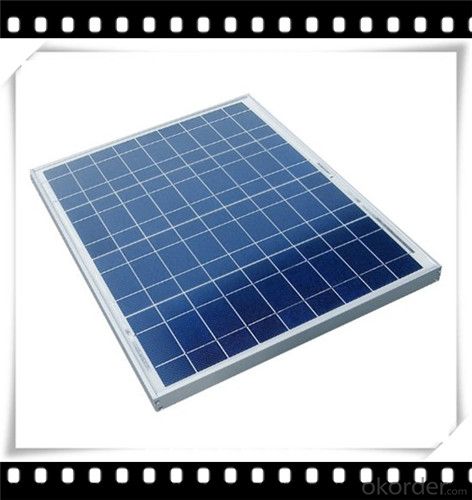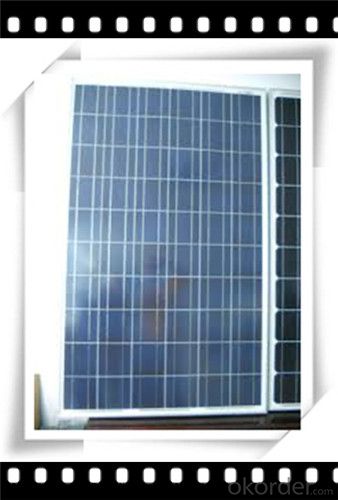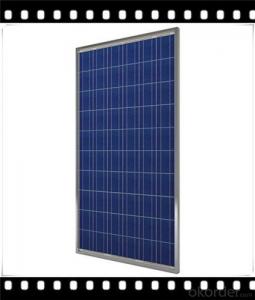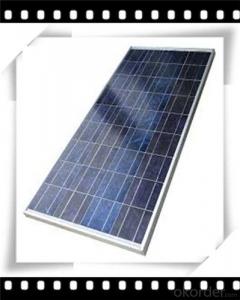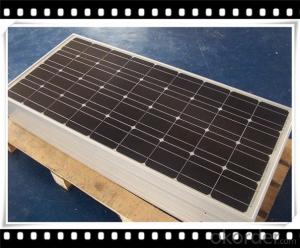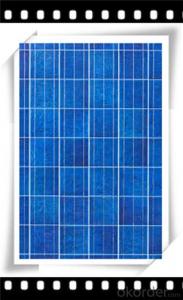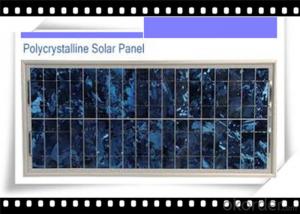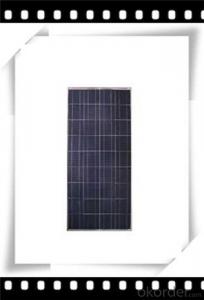3x6 Poly Solar Panel Medium Solar Panel Hot Selling Solar Panel CNBM
- Loading Port:
- Qingdao
- Payment Terms:
- TT OR LC
- Min Order Qty:
- 10 set
- Supply Capability:
- 300000 set/month
OKorder Service Pledge
OKorder Financial Service
You Might Also Like
Polycrystalline Solar Modules
CNBM offers a range of small, medium and large polycrystalline solar modules, designed for a range of requirements.
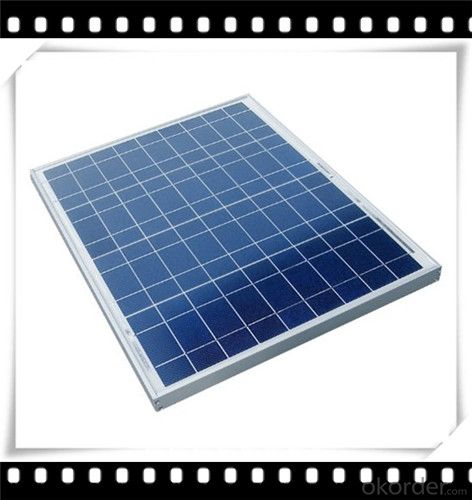
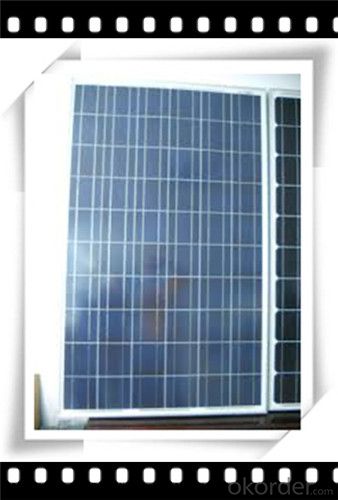
Specifications:
+/-3% |
Polycrystalline silicon solar cells (156 x 156mm) |
60 (10 x 6) |
1650 x 990 x 40 |
25.5 |
Limits:
Operating Temperature | -40~+85? |
Storage Temperature | -40~+85? |
Maximum System Voltage | 1000 VDC max. |
Hail Impact | Diameter of 28mm with impact speed |
Temperature and Coefficients:
NOCT | 48C+/-2? |
Voltage temperature coefficient (%/K) | -0.35 |
Current temperature coefficient (%/K) | 0.05 |
Power temperature coefficient (%/K) | -0.45 |
Characteristics:
Model: | SGM-200P | SGM-210P | SGM-220P |
Max-power voltage Vmp (V) | 29.2 | 29.4 | 29.41 |
Max-power current Imp (A) | 6.85 | 7.14 | 7.48 |
Open-circuit voltage Voc (V) | 36.5 | 36.69 | 36.9 |
Short-Circuit Current Isc (A) | 7.28 | 7.6 | 7.93 |
Max-power Pm(W) | 200 | 210 | 220 |
Model: | SGM-230P |
Max-power voltage Vmp (V) | 29.8 |
Max-power current Imp (A) | 7.72 |
Open-circuit voltage Voc (V) | 37.31 |
Short-Circuit Current Isc (A) | 8.19 |
Max-power Pm(W) | 230 |
STC: Irradiance 1000W/m2, module temperature 25?, AM-=1.5
Poly Crystalline Solar Panels Specifications Range
Maximum Power (Pm) | Dimension | Weight | Operating Voltage (Vmp) | Operating Current (Imp) | Open Circuit Voltage (Voc) | Short Circuit Current (Isc) |
0.45W | 140x80x10mm | 0.08kg | 3.3V | 150mA | 4.6V | 160mA |
1.0W | 162x140x10mm | 0.16kg | 7.5V | 150mA | 10.3V | 160mA |
4.5W | 269x251x23mm | 0.8kg | 16.5V | 0.27A | 20.5V | 0.3A |
10W | 420.1×268.9×22.6mm | 1.92kg | 17.5V | 0.58A | 20.5V | 0.6A |
20W | 425x502x50mm | 3.0kg | 16.8V | 1.19A | 21.0V | 1.29A |
30W | 593x502x22.6mm | 3.9kg | 16.8V | 1.78A | 21.0V | 1.94A |
40W | 655x537x50mm | 5.75kg | 17.3V | 2.31A | 22.1V | 2.54A |
50W | 839x537x50mm | 6.0kg | 17.5V | 2.9A | 21.8V | 3.17A |
65W | 1111x502x50mm | 7.2kg | 17.6V | 3.69A | 22.1V | 3.99A |
80W | 1204x537x50mm | 7.7kg | 17.6V | 4.55A | 22.1V | 4.8A |
- Q: Are there any government incentives or tax credits for installing solar panels?
- Yes, there are indeed government incentives and tax credits available for installing solar panels. These incentives and credits vary by country and even by state within a country. Many governments offer tax credits, grants, or rebates to promote the adoption of solar energy. Additionally, some countries have implemented feed-in tariffs, which allow solar panel owners to sell excess electricity back to the grid at a premium rate. It is advisable to check with local authorities or consult a professional to understand the specific incentives and tax credits available in your area.
- Q: Are solar panels a good investment?
- Yes, solar panels are a good investment. They offer long-term financial benefits through reduced electricity bills, potential tax incentives, and increased property value. Additionally, they contribute to a cleaner environment by reducing carbon emissions and dependence on fossil fuels.
- Q: Can solar panels be used to power a data center?
- Yes, solar panels can be used to power a data center. Solar energy can be harnessed through photovoltaic panels and converted into electricity to power a data center's operations. This approach helps reduce reliance on traditional energy sources and promotes sustainability. However, the feasibility and effectiveness of using solar panels will depend on factors like the size of the data center, available sunlight, and energy requirements.
- Q: Can anyone give me a link to a website that sells really big solar panels? Enough to run a small cafe on entirely solar power.
- Larger solar arrays are made by grouping more solar panels together. There are no large solar panels. They are all about the same size. Do an internet search on solar photovoltaic panels, and you will get hundreds of hits from on line companies that sell them. Most have a sales consultant you can e-mail who will help you decide what you need.
- Q: Does anyone know how I would go about hooking up the air conditioners in my house to solar panels? I would want just the air conditioners to be powered by solar energy. How could I hook it up where the panels can absorb energy from the sun during the day, and save and store the energy so I can run the air conditioners at night? I really feel that in the long run, this would save a lot of money with the energy bill. It's the use of the air conditioners that drive up the bill. Is this idea feasible? Is it also possible to have some sort of hybrid system where I can switch from solar to my regular local energy source when I want to?
- There's no need to connect only the A/C to solar, nor is there a need to use batteries. Both of those problems are solved with grid-tied solar. The solar electricity system works alongside your regular, and the A/C just plugs in normally. You never need to worry about switching. During the day, if the A/C is drawing power, the solar goes into that, reducing your draw from the electric company. If the solar generates more than the A/C needs, the meter is driven backwards. At night, the meter runs forward again. For example, the meter may read 5000 in the morning. By evening, maybe it reads 4975. At night, it creeps back up to 5005. When the meter reader comes, you would be billed for only 5 kWh. That's the general idea. Also, consider whether you can insulate your home more, and whether you might want to change out your air conditioners for new, DC inverter mini-split units. Those can use a fraction of the electricity per BTU of regular air conditioners.
- Q: I've been figuring ways to keep water thawed out this winter, and this bucket seems to be the easiest thing. What kind of set up (solar panel) would I need to feed this 260 watt heated bucket?
- Unfortunately solar panels are low output,generally only 2 volt and very low amperage,so you would need to build a multi panel array with a DC-AC converter all together costing several hundred dollars which would only work during sunlight.Just roughly figuring,about $800. Plan2-Solar charger,battery bank,and DC-AC inverter so it would work 24hrs a day,also several hundred $$. Solar power does just not seem feasible(to me)in this application.By far the cheapest set up here would be an extension cord fromhouse to the bucket.260 watts per hr is a fairly lightweight draw,even not figuring the thermostat's cycling it on and off as needed.Electricity is sold in kilowatt hours(000W/hr).This bucket would use(not allowing for thermostats control lowering it)appx 6000watts or 6KW per day.Depending on your electrical cost per Kwh it would cost very little to run.(In my location appx 50cents a day) or appx the same amount as my computer(325watts total)) Note that that would be a maximum rate,and would actually be less due to thermostat cycling off and on as needed.
- Q: I am told there are night vision goggles to see at night due to invisible light still hitting earth. I am also told that there are other beams, x-rays etc hitting earth.Why couldn't they invent a solar panel with dual power in the day?It could harness both visible and invisible light, and at night be single?Anyone know why they can't make an invisible light solar panel?Is this possible?What happens if future cars have night vision windshields instead of lights?
- No night vision takes star light and intensifies it by 30,000 times.
- Q: Is there a small solar panel system that I can put in my bedroom window and charge my phone and run an alarm clock off of? Or one I can run a microwave off of?
- You can cosider this product Flexible Personal Solar Panel. I think it will be helpful. Product Review Take the lightweight, easy-to-pack Brunton Solaris 6 / 2 Solar Panels on your next expedition to the Himalayas or down that nearby trail or dirt road. Brunton used CIGS, the most efficient thin-film solar technology available, to create the Solaris. Choose either the Solaris six-watt or 2-watt panel—both of them fold up to the size of a CD wallet and work, even in overcast conditions, to charge your cell phone, digital camera, camcorder, iPod, and other small electronics. A built-in reversing diode prevents the solar panel from discharging your batteries when the sun disappears for the night. Brunton's Solaris 2-watt panel can even charge your satellite phone or trickle charge your laptop.
- Q: Can solar panels be used for charging electric vehicles?
- Yes, solar panels can be used for charging electric vehicles. Solar panels convert sunlight into usable electricity, which can then be used to charge the battery of an electric vehicle. This enables vehicles to be charged with clean, renewable energy, reducing both emissions and dependence on fossil fuels.
- Q: Does anyone own any and would you recommend them? right now i only own solar stake lights and i use them during the summer in my yard. But during the winter i take them out because they don't charge well. I live in toronto canada where it snows a lot during the winter, would it even be worth it to buy solar panels? Would they get covered with snow if the were mounted on my roof and get ruined? I plan on buying some when i purchase my own home.Any info would be appreciated:)
- You may have to put a snow roof over the wind generator to keep it working. A solar hot water system might be hard investment where you are but it could work if it's designed right. Check out the solar companies in your area for ideas.
Send your message to us
3x6 Poly Solar Panel Medium Solar Panel Hot Selling Solar Panel CNBM
- Loading Port:
- Qingdao
- Payment Terms:
- TT OR LC
- Min Order Qty:
- 10 set
- Supply Capability:
- 300000 set/month
OKorder Service Pledge
OKorder Financial Service
Similar products
Hot products
Hot Searches
Related keywords
